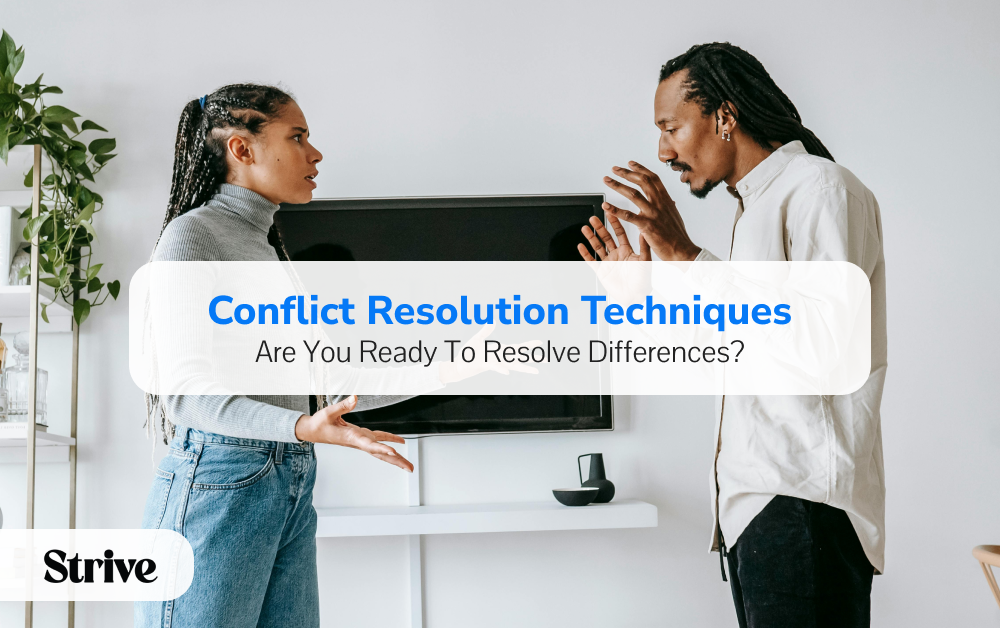Did you know that conflict can be a catalyst for growth and positive change in relationships? It’s true! Mismanaged conflict can cause harm, but when handled effectively, it can strengthen and deepen connections. Conflict is more than just disagreements; it involves perceived threats and triggers strong emotions. To resolve conflicts, it’s crucial to recognize conflicting needs, practice active listening, and be emotionally aware. Are you ready to learn the essential techniques for effective conflict resolution?

Key Takeaways:
- Conflict is a normal part of relationships and can be an opportunity for growth.
- Resolving conflicts requires understanding conflicting needs and practicing active listening.
- Emotional awareness is essential for addressing and managing conflicts effectively.
- Effective conflict resolution techniques can strengthen relationships and promote positive change.
- Are you prepared to develop the skills needed to navigate conflicts successfully?
The Nature of Conflict
Conflict is more than just a disagreement; it involves perceived threats. When conflicts are left unaddressed, they tend to escalate and cause further harm. Our responses to conflicts are shaped by our perceptions, which are influenced by our life experiences, values, and beliefs.
Conflicts trigger strong emotions that can intensify the situation if not managed effectively. It is important to recognize and address these emotions while resolving conflicts. However, conflicts can also present growth opportunities for both individuals and relationships when handled in a healthy manner.
“In the midst of chaos, there is also opportunity.” – Sun Tzu
By navigating conflicts with open communication, empathy, and problem-solving skills, we can find resolutions that not only address the immediate issues but also foster personal and relationship growth. Conflict, when approached constructively, allows us to understand each other better, learn from different perspectives, and develop stronger bonds.
Emotions in Conflicts
Emotions play a significant role in conflicts. When conflicts arise, a range of emotions such as anger, frustration, fear, and sadness can surface. It is essential to manage these emotions effectively to prevent them from escalating the conflict further.
Growth Opportunities in Conflicts
While conflicts are often viewed as negative experiences, they also provide opportunities for growth. Resolving conflicts gives us the chance to develop valuable skills such as communication, empathy, and problem-solving. It allows us to understand different viewpoints, challenge our own assumptions, and find creative solutions to complex issues.
Causes of Conflict in the Workplace
Workplace conflicts can often be attributed to various factors that contribute to a challenging and tense environment. Addressing these causes is crucial for fostering a harmonious and productive workplace. The key causes of conflict in the workplace include:
- Poor Communication: Inadequate communication channels or ineffective communication strategies can lead to misunderstandings, misinterpretations, and conflicts among employees.
- Unclear Performance Expectations: When employees are unsure about their roles, responsibilities, and performance standards, it can create confusion and conflict.
- Time Management Issues: Poor time management practices, such as missed deadlines or excessive workloads, can lead to stress, frustration, and conflicts in the workplace.
- Cloudy Employee Roles: Ambiguity regarding job roles, responsibilities, and authority can cause conflicts as employees may overstep boundaries or encounter role clashes.
When these factors are present in the workplace, they can contribute to a toxic and unproductive work environment, resulting in decreased job satisfaction, increased turnover rates, and decreased overall performance.
By addressing these causes of conflict and implementing effective conflict resolution strategies, organizations can create a positive and harmonious work environment that promotes teamwork, productivity, and employee well-being.
Key Conflict Resolution Skills
Conflict resolution requires a set of essential skills to effectively manage and resolve conflicts. These skills include active listening, emotional intelligence, patience, impartiality, positivity, and open communication.
Active Listening: Actively listening involves giving your full attention to the other person and seeking a deep understanding of their perspective. It requires asking questions, paraphrasing, and reflecting on what the other person is saying to ensure clear communication.
Emotional Intelligence: Emotional intelligence plays a crucial role in conflict resolution. It involves recognizing and managing emotions, both your own and others’, to navigate conflicts effectively. By understanding and regulating emotions, you can approach conflicts with empathy and find mutually beneficial solutions.
Patience: Patience is a key virtue in conflict resolution. Conflicts often take time to resolve, and rushing the process can lead to further complications. By remaining patient, you allow the conflict resolution process to unfold naturally and for all parties to express their concerns and needs.
Impartiality: Being impartial means approaching conflicts with fairness and objectivity. It involves focusing on addressing the problem rather than placing blame on individuals. This impartial stance encourages a collaborative approach to finding solutions that benefit everyone involved.
Positivity: Maintaining a positive attitude is crucial in conflict resolution. By staying positive, you create a constructive environment where conflicts can be resolved effectively. Positivity encourages open-mindedness, creativity, and a willingness to work towards finding common ground.
Open Communication: Open communication is the foundation of conflict resolution. It involves creating a safe space for all parties to express their thoughts, feelings, and needs. By promoting open communication, conflicts can be addressed directly, fostering understanding, empathy, and the potential for a mutually satisfactory resolution.
Benefits of Key Conflict Resolution Skills
- Improved understanding of differing perspectives.
- Enhanced empathy and emotional management.
- Easier identification of common ground.
- Reduced tension and improved relationships.
- Efficient resolution of conflicts.
Example Scenario:
Imagine a team meeting where a conflict arises between two team members regarding a project deadline. By applying key conflict resolution skills, the team leader actively listens to both parties, allowing each person to express their concerns without interruption. The leader demonstrates emotional intelligence by acknowledging the emotions involved and managing their own emotional responses.
With patience, the leader allows both individuals to fully express their viewpoints and needs. Impartiality is maintained as the leader focuses on finding a mutually agreeable solution rather than placing blame or favoring one person over the other.
By fostering a positive environment through open communication, the team leader encourages both individuals to share their ideas for meeting the deadline. Through effective communication, the team members identify a compromise that accommodates both parties’ needs, resulting in a resolution that maintains positive working relationships and ensures project success.
| Key Conflict Resolution Skills | Description |
|---|---|
| Active Listening | Being attentive and asking questions to understand the other person’s viewpoint. |
| Emotional Intelligence | Perceiving and managing emotions to navigate conflicts effectively. |
| Patience | Necessary as conflicts take time to resolve. |
| Impartiality | Addressing the problem rather than blaming individuals. |
| Positivity | Creating a constructive environment. |
| Open Communication | Fostering healthy relationships. |
Conflict Resolution Strategies
When conflicts arise, it’s important to address them head-on using effective conflict resolution strategies. By actively addressing the conflict, clarifying the underlying issue, bringing all parties together, identifying a mutually agreeable solution, and implementing diligent monitoring and follow-up, conflicts can be resolved in a way that promotes open communication, problem-solving, and a win-win outcome.
Addressing the conflict rather than ignoring it is the first step in finding a resolution. By acknowledging the conflict and its impact, you create an opportunity for productive dialogue and problem-solving.
Clarifying the issue causing the conflict is crucial for a meaningful resolution. By understanding and communicating the root cause, all parties involved can gain a clearer perspective and work toward resolving the conflict effectively.
Bringing the involved parties together is essential for open and constructive communication. By facilitating a meeting or discussion, you create a safe space for individuals to express their viewpoints, concerns, and emotions.
Identifying a solution acceptable to everyone involved requires a collaborative effort. By encouraging active participation, brainstorming, and compromise, a resolution can be reached that satisfies the interests and needs of all parties.
Monitoring and following up on the resolution is important to ensure its effectiveness and sustainability. Regular check-ins and feedback sessions can help identify any ongoing issues or concerns and address them promptly.
Employing conflict resolution strategies promotes a positive and harmonious environment where conflicts are resolved efficiently, fostering healthier relationships and a more productive work or personal setting.
Role of Emotional Intelligence in Conflict Resolution
Emotional intelligence is a vital component in effectively resolving conflicts. It encompasses a range of skills and qualities that enable individuals to understand and manage emotions, be self-aware, practice empathy, and promote diversity and inclusion. By harnessing emotional intelligence, individuals can navigate conflicts with greater understanding, empathy, and respect, leading to more successful resolutions.
One key aspect of emotional intelligence in conflict resolution is understanding emotions. Emotions often underlie conflicts, influencing how individuals perceive and react to a situation. By recognizing and addressing these underlying emotions, individuals can better understand the root causes of conflict and work towards a resolution that satisfies the needs of all parties involved.
“Emotional intelligence allows individuals to navigate conflicts with empathy and understanding, fostering a safe and inclusive environment for all.”
Self-awareness is another important element of emotional intelligence. Being aware of one’s own emotions, triggers, and biases enables individuals to approach conflicts with greater self-control and objectivity. This self-awareness helps in managing emotional reactions, reframing perspectives, and finding constructive solutions rather than engaging in reactive and harmful behaviors.
Empathy is a powerful tool for resolving conflicts. By putting themselves in the shoes of others and seeking to understand their perspectives and emotions, individuals can foster greater empathy, compassion, and cooperation. Empathy nurtures a sense of fairness and understanding, which can pave the way for finding mutually beneficial solutions and resolving conflicts in a way that strengthens relationships and builds trust.
Inclusive and diverse perspectives are vital for effective conflict resolution. Embracing diversity and inclusion brings together different viewpoints, experiences, and problem-solving approaches. This diversity enriches the understanding of conflicts, promotes creativity in finding solutions, and helps avoid biases and stereotypes that can hamper conflict resolution. Creating an environment that values diversity and inclusion encourages open dialogue and collaboration, leading to more effective and lasting resolutions.
Diversity and Inclusion in Conflict Resolution
Table: Benefits of Diversity and Inclusion in Conflict Resolution
| Benefits | Description |
|---|---|
| Broader Perspectives | Diverse perspectives offer a wider range of insights and solutions to conflicts. |
| Creative Problem-Solving | Diverse teams bring different approaches and ideas, fostering innovation in conflict resolution. |
| Reduced Bias | Inclusive environments challenge biases and stereotypes, leading to more equitable resolutions. |
| Enhanced Understanding | Diversity promotes empathy and understanding across different backgrounds and experiences. |
By embracing emotional intelligence, individuals can navigate conflicts with greater understanding, empathy, and inclusiveness. Recognizing and managing emotions, cultivating self-awareness, practicing empathy, and valuing diversity are key pillars of emotional intelligence in conflict resolution. Incorporating these skills and qualities into conflict resolution processes fosters healthier relationships, more effective resolutions, and a more harmonious and inclusive environment.
Conflict Resolution in the Workplace
Effective conflict resolution skills are vital for leaders in the workplace to effectively address and resolve conflicts. Poor communication, unclear performance expectations, time management issues, and cloudy employee roles are some of the common causes of conflict in the workplace. By employing effective communication techniques, problem-solving skills, and decision-making abilities, leaders can successfully navigate and resolve conflicts, fostering a positive work environment.
One of the main causes of conflict in the workplace is poor communication. Misunderstandings and misinterpretations can easily arise when information is not effectively communicated among team members. This can lead to frustration, resentment, and ultimately conflict. By improving communication skills such as active listening and clear expression, leaders can help prevent conflicts from escalating and find mutually beneficial resolutions.
Unclear performance expectations can also contribute to workplace conflict. When employees are unsure about what is expected of them, tensions can arise as different interpretations and standards clash. Leaders should ensure that performance expectations are clearly communicated, documented, and regularly reviewed. By providing clarity and guidance, leaders can minimize the likelihood of conflicts arising due to unclear expectations.
Time management issues are another common source of conflict in the workplace. When deadlines are missed or priorities are not effectively managed, it can create frustration and resentment among team members. Leaders should encourage effective time management practices, set realistic deadlines, and provide support when necessary. By addressing time management issues proactively, leaders can minimize potential conflicts and improve overall productivity.
Cloudy employee roles and responsibilities can also contribute to workplace conflict. When there is confusion about who is responsible for what, tasks can be overlooked or duplicated, leading to avoidable conflicts. Leaders should ensure that employee roles and responsibilities are clearly defined and communicated. By fostering a sense of clarity and accountability, leaders can mitigate conflicts arising from role ambiguity.
Leaders who possess effective conflict resolution skills are able to address conflicts promptly and create an environment conducive to resolution. They have the ability to facilitate open communication, guide individuals towards a solution, and promote a collaborative approach to problem-solving. By employing effective communication techniques, problem-solving skills, and decision-making abilities, leaders can resolve conflicts in a fair and constructive manner, ultimately strengthening the team and fostering a positive work culture.
| Common Causes of Workplace Conflict | Effective Communication Techniques | Problem-Solving and Decision-Making Abilities |
|---|---|---|
| Poor communication | Active listening | Identifying and evaluating potential solutions |
| Unclear performance expectations | Clear expression of thoughts and concerns | Reaching consensus on the best course of action |
| Time management issues | Regular and transparent communication | Implementing the chosen solution effectively |
| Cloudy employee roles | Providing feedback and guidance | Monitoring and evaluating the outcomes |
Top 5 Conflict Management Strategies
When conflicts arise, it’s crucial to have effective strategies in place to address them and find resolutions. Here are the top 5 conflict management strategies that promote open communication, collaboration, and fair resolution:
- Addressing conflicts: Avoiding or ignoring conflicts can escalate the situation. By acknowledging and addressing conflicts directly, you can prevent them from worsening and create opportunities for resolution.
- Clarifying the issues: Sometimes conflicts arise from misunderstandings or miscommunication. By clarifying the issues at hand, all parties involved can gain a clearer understanding of the underlying problem and work towards a solution.
- Bringing parties together: Collaboration is key in conflict resolution. Bringing all parties involved together to discuss their perspectives, interests, and concerns fosters understanding and helps find common ground.
- Identifying solutions: The goal of conflict management is to find a mutually acceptable solution. By brainstorming and exploring various options, parties can work together to identify solutions that meet everyone’s needs.
- Monitoring and follow-up: Resolving conflicts is an ongoing process. After reaching a resolution, it is important to monitor the implementation and follow up to ensure that the agreement is upheld and any residual conflicts are addressed effectively.
By implementing these conflict management strategies, organizations and individuals can navigate conflicts in a fair and respectful manner, fostering healthy relationships and promoting positive outcomes.
| Conflict Management Strategies | Key Features |
|---|---|
| Addressing conflicts | Acknowledge and confront conflicts directly |
| Clarifying the issues | Identify and clear up any misunderstandings |
| Bringing parties together | Encourage collaboration and understanding between conflicting parties |
| Identifying solutions | Explore and find mutually acceptable solutions |
| Monitoring and follow-up | Ensure the resolution is maintained and address any remaining conflicts |
Leveraging Conflict Resolution Skills for Career Growth
Conflict resolution skills are not only crucial for resolving differences in relationships but also for personal and professional growth. By developing these skills, individuals can become effective leaders, role models, and problem solvers in their careers. Leveraging conflict resolution skills can open up opportunities for advancement, increased responsibility, and improved workplace relationships.
One way to enhance conflict resolution skills is through leadership development programs. These programs provide training and guidance on effectively managing conflicts and leading others through challenging situations. They equip individuals with the necessary tools and strategies to address conflicts proactively, facilitate open communication, and foster a positive work environment.
Another avenue for honing conflict resolution skills is by participating in training and development opportunities. These programs offer workshops, seminars, and courses specifically designed to enhance communication, negotiation, and problem-solving skills. Through hands-on exercises and real-life scenarios, individuals can develop a deep understanding of conflict dynamics and learn how to navigate them effectively.
Leading by example is a powerful way to demonstrate conflict resolution skills in the workplace. When individuals consistently act as positive role models by approaching conflicts with empathy, active listening, and open-mindedness, they inspire their colleagues to do the same. This creates a culture of respect and collaboration, where conflicts are seen as opportunities for growth and innovation.
Building strong workplace relationships is essential for leveraging conflict resolution skills. Effective communication skills play a crucial role in establishing and maintaining positive connections with colleagues. By actively listening to others, expressing thoughts and emotions clearly and respectfully, and seeking understanding, individuals can foster trust, empathy, and mutual respect among team members.
In conclusion, conflict resolution skills are not only valuable for resolving differences but also for career growth. By investing in leadership development programs, participating in training and development opportunities, leading by example, and building strong workplace relationships, individuals can leverage their conflict resolution skills for personal and professional advancement. These skills contribute to creating a positive work environment, resolving conflicts effectively, and fostering collaboration and innovation.
The Importance of Emotional Intelligence
Emotional intelligence plays a vital role in conflict resolution. It encompasses various skills and qualities that contribute to effective resolution and positive outcomes. Let’s explore the key aspects of emotional intelligence that are essential for navigating conflicts:
Active Listening
Active listening is a core component of emotional intelligence in conflict resolution. It involves giving full attention to the speaker, understanding their perspective, and responding thoughtfully. By actively listening, you can foster understanding, empathy, and open communication, which are crucial for resolving conflicts.
Empathy
Empathy is the ability to understand and share the feelings of others. In conflict resolution, empathy helps you recognize and acknowledge the emotions of all parties involved. By putting yourself in their shoes, you can better comprehend their perspective, build trust, and find mutually beneficial solutions.
Problem-Solving
Problem-solving skills are an integral part of emotional intelligence. They enable you to approach conflicts with a constructive mindset, focusing on finding effective solutions rather than dwelling on the problem. By utilizing creative thinking, collaboration, and critical analysis, you can identify win-win outcomes and address conflicts proactively.
Self-Awareness
Self-awareness involves understanding your own emotions, strengths, weaknesses, and triggers. In conflict resolution, self-awareness allows you to manage your emotions effectively and prevent them from clouding your judgment. By recognizing your own biases and reactions, you can approach conflicts with a calm and objective mindset, promoting productive dialogue.

Key Takeaways
- Emotional intelligence is crucial for conflict resolution, encompassing skills such as active listening, empathy, problem-solving, and self-awareness.
- Active listening helps foster understanding and open communication during conflicts.
- Empathy allows you to recognize and acknowledge the emotions of all parties involved.
- Problem-solving skills enable you to approach conflicts with a constructive mindset and find effective solutions.
- Self-awareness helps you manage your own emotions and approach conflicts with a calm and objective mindset.
Conflict Resolution Techniques in Practice
When it comes to resolving conflicts, employing effective techniques can make all the difference. By utilizing specific strategies, individuals can navigate conflicts with confidence, empathy, and open communication. Here are some conflict resolution techniques that can be put into practice:
- “Yes, And” Statements: Instead of shutting down ideas or perspectives, embrace the “yes, and” mindset. Build on each other’s ideas to foster collaboration and find creative solutions.
- Active Listening: Truly hearing and understanding the other person’s point of view is crucial in conflict resolution. Practice active listening by maintaining eye contact, asking clarifying questions, and paraphrasing to ensure you comprehend their perspective.
- “I” Statements: Expressing your emotions and opinions using “I” statements can help keep discussions focused on the issue at hand without blaming or attacking the other person. For example, say, “I feel frustrated when…” instead of “You always…”
- Maintaining a Calm Tone: Keeping emotions in check and maintaining a calm tone encourages rational discussion rather than escalating tensions. Take deep breaths and consciously choose your words and tone of voice to foster a constructive environment.
- Willingness to Compromise: Conflict resolution often requires finding middle ground and seeking solutions that all parties can agree on. Being open to compromise shows a commitment to resolving the conflict rather than remaining stubbornly focused on personal interests.
- Open Communication: Encourage open and honest communication throughout the conflict resolution process. This includes actively sharing your thoughts, feelings, and concerns while being receptive to feedback from the other person.
By incorporating these conflict resolution techniques, individuals can work towards resolving conflicts effectively while maintaining positive relationships and fostering a collaborative environment.
Incorporating conflict resolution techniques such as “yes, and” statements, active listening, “I” statements, maintaining a calm tone, willingness to compromise, and open communication can pave the way for successful conflict resolution.
Conclusion
Conflict resolution techniques play a crucial role in resolving differences and fostering healthy relationships. Effective communication, empathy, active listening, and problem-solving skills are key components of successful conflict resolution. By mastering these techniques, individuals can navigate conflicts in a constructive and productive manner.
It is important to recognize that conflict can offer opportunities for personal and relationship growth. Rather than avoiding or suppressing conflicts, embracing them with the right mindset can lead to transformative experiences. By approaching conflicts with empathy, open communication, and a willingness to find common ground, individuals can not only resolve differences but also build stronger connections.
Through conflict resolution, individuals can develop a deeper understanding of themselves and others. They can learn to manage their emotions, gain new perspectives, and become more effective problem solvers. Conflict resolution also promotes effective communication skills, which are essential for maintaining healthy relationships and creating a positive work environment.
Ultimately, conflict resolution techniques empower individuals to navigate conflicts with confidence and create a harmonious environment. By embracing effective communication, understanding the importance of empathy, and developing strong problem-solving skills, individuals can not only resolve conflicts but also foster personal and professional growth. Conflict, when managed effectively, becomes an opportunity for positive change and builds stronger relationships.
FAQ
What are conflict resolution techniques?
Why is effective conflict management important?
What are some key conflict resolution skills?
What are some common causes of workplace conflict?
How can emotional intelligence contribute to conflict resolution?
What are some conflict resolution strategies?
Source Links
- https://www.helpguide.org/articles/relationships-communication/conflict-resolution-skills.htm
- https://online.champlain.edu/blog/top-conflict-resolution-strategies
- https://blog.hubspot.com/service/conflict-resolution-skills








GIPHY App Key not set. Please check settings